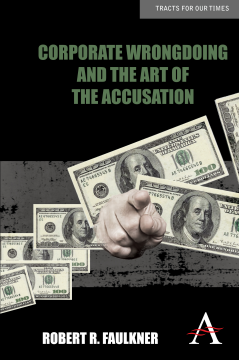
Additional Information
Book Details
Abstract
This book addresses an old and basic question: what is the moral order of the market? ‘Corporate Wrongdoing and the Art of the Accusation’ is an exploration of accusations of wrongdoing, and the revelations these accusations expose about the dark side of capitalism and modern corporations, and their relationships with suppliers, buyers, peers, investment banks and state regulators. The study explores data gathered from the past twenty years, including over a thousand accusations of economic wrongdoing in corporate America. The research traces exchange paths or structural routes; cultural recipes or ideas about wrongdoing; and interactions between the culture and structure of transgression in economic in markets.
Repertoires of accusation, and the three-way associations between accused, accuser and accusation, reveal the moral order of the market. The tools provided in this data collection and analysis provide a template for the study of the three-way relationship between the following: cultural items or types (i.e., accusation types), structural locations or paths (i.e., market interfaces) and time (i.e., temporal locations of types and paths, or recipes and routes). Repertoires unlock the moral order of the modern market and other institutions (family, politics, education, religion, science) as revealed in accusations of transgression.
This book addresses an old and basic question: what is the moral order of the market? ‘Corporate Wrongdoing and the Art of the Accusation’ is an exploration of accusations of wrongdoing, and the revelations these accusations expose about the dark side of capitalism and modern corporations in their relationships with suppliers, buyers, peers, investment banks and state regulators. The study explores data gathered from the past twenty years, including over a thousand accusations of economic wrongdoing in corporate America.
‘Professor Faulkner has amassed a database of over a thousand accusations of economic wrongdoing in corporate USA in the past 20 years, all of which highlight “the market interplay between the culture and structure of transgression” … [H]e presents an eyes-wide-open approach to understanding illegal repertoires of self-interest… that have sway in dealings among corporations, markets and states. These alliances can undermine, attack and even destroy legitimate entrepreneurship in the marketplace. Prof. Faulkner explains much about how we got into this mess we’re in.’ —Ruth Parnell, ‘Nexus’
Robert R. Faulkner is Professor of Sociology at the University of Massachusetts Amherst.
‘[T]he book has much to offer researchers who want to understand the cultural and network dimensions of accusations of corporate wrongdoing.’ —Harland Prechel, ‘American Journal of Sociology’
‘This path-breaking book explores the cultural elements and practice of claims of normative violations in the operation of organizations and individuals in capitalist system, and vastly expands the agenda of what has previously been treated in the study of white collar crime. A remarkable contribution.’ —Professor Mayer Zald, University of Michigan
‘Robert Faulkner adds a new, fascinating, and persuasive dimension to our understanding of corporate law-breaking, by demonstrating that it is accusations rather than official actions against capitalist enterprises that hit the hardest. Accusations claim the infliction of grievous harm, assume guilt, and employ defamatory language and derogatory portraits of alleged perpetrators that are far severer than those which appear when the enforcement and adjudicatory agencies take over. This is a book that will enlighten readers seeking to comprehend the dynamics of the recent economic meltdown and earlier episodes of malfeasance in the corporate world.’ —Professor Gilbert Geis, University of California, Irvine
‘[R]eaders willing to think outside the box in which contemporary organization theory on wrongdoing is currently trapped will be amply rewarded. “Corporate Wrongdoing” raises fundamental issues that our field has largely ignored.’ —Donald Palmer, ‘Administrative Science Quarterly’
Table of Contents
| Section Title | Page | Action | Price |
|---|---|---|---|
| Cover | i | ||
| Front Matter | ii | ||
| Half Title | ii | ||
| Title | iv | ||
| Copyright | v | ||
| Contents | viii | ||
| Acknowledgments | x | ||
| Main Matter | 1 | ||
| 1 Accusations: Between the Innuendo and the Illegal | 1 | ||
| 2 Red Flags: How to Assemble an Accusation | 29 | ||
| 3 Fighting Words and Key Phrases | 41 | ||
| 4 Market Exchanges Gone Sour: Six Fields of Action | 55 | ||
| Market-Based Tie Number 1: Accusations of Wrongdoing In and Around the Corporation | 56 | ||
| Market-Based Tie Number 2: Accusations Involving Rivals, Industry Peers, and Competitors | 63 | ||
| Market-Based Tie Number 3: Accusations Involving Suppliers of Resources, Goods, and Services and Commercial Banks | 68 | ||
| Market-Based Tie Number 4: Accusations Involving Buyers of Products, Customers of Resources, Clients of Services, and Investors in Securities and Pension Funds | 72 | ||
| Market-Based Tie Number 5: Accusations Involving Investment Banks, Analysts, Advisers, Rating Agencies, and the Registered Investment Community | 81 | ||
| Market-Based Tie Number 6: Accusations Involving Government Officials and Federal, State and Local Regulators | 86 | ||
| 5 Finger Pointing and Three Themes: Lying, Cheating, Stealing | 93 | ||
| Principal Theme A: Misrepresentation, Fraud, and Deception | 94 | ||
| Principal Theme B: Misdirection, Bribery, Extortion, and Hostage Taking | 96 | ||
| Principal Theme C: Circumvention of Rules, Regulations, and Securities Law | 103 | ||
| 6 The Ecology of Greed: Hot Spots for Accusations | 115 | ||
| 7 The Repertoires of Wrongdoing | 123 | ||
| Appendix A Notes on Statistical Analysis and Coding Principal Themes, Keywords, and Key Phrases in the Accusations | 143 | ||
| Appendix B A Sample of United States Corporations and Counts of Public Announcements of Alleged Economic Crime – 1994 (fourth quarter) to 2006 (first quarter) | 149 | ||
| Tables | 155 | ||
| End Matter | 161 | ||
| References | 161 | ||
| Index | 177 |
